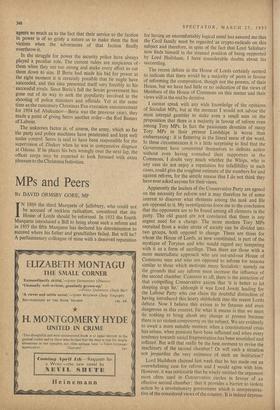MPs and Peers
IN 1869 the third Marquess of Salisbury, who could not be accused of reckless radicalism, considered that the House of Lords should be reformed. In 1933 the fourth Marquess introduced a Bill to bring about such a reform and in 1955 the fifth Marquess has declared his determination to succeed where his father and grandfather failed. But will he? A parliamentary colleague of mine with a deserved reputation for having an uncomfortably logical mind has assured me that the Cecil family must be regarded as crypto-radicals on this subject and therefore, in spite of the fact that Lord Salisbury now finds himself in the unusual position of being supported by Lord Hailsham, 1 have considerable doubts about his succeeding.
The recent debate in the House of Lords certainly seemed to indicate that there would be a majority of peers in favour of reforming the composition, though not the powers, of their House, but we have had little or no indication of the views of Members of the House of Commons on this matter and their views will in the end be decisive.
I cannot speak with any wide knowledge of the opinions of Socialist MPs, but at the moment I would not advise the most intrepid gambler to stake even a small sum on the proposition that there is a majority in favour of reform even among Tory MPs. In fact the passionate devotion of many Tory MPs to their present Lordships is worse than embarrassing : it is flattering in the literal sense of the word. In these circumstances it is a little surprising to find that the Government have committed themselves to definite action without even having consulted their supporters in the Commons. I doubt very much whether the Whips, who in any case do not enjoy a reputation for infallibility in such cases, could give the roughest estimate of the numbers for and against reform, for the simple reason that I do not think they have ever asked anyone for their views. ing to find that the least valid argument is the only one that receives any wide acceptance in the party. The belief that demagogic tribunes of the people could be bridled by a con- stitutional safeguard as flimsy as a reformed House of Lords is one which denotes a fancifully optimistic turn of mind in the believer. In a truly revolutionary situation, which seems happily remote, their Lordships would be of much more use manning the barricades in Whitehall than manning their benches at Westminster.
It is almost Certainly true that in the House of Commons as a whole there is a majority in favour of a bicameral legis- lature and it would therefore seem to be foolish of this majority to allow a situation to develop in which the second chamber became not only unrepresentative and anomalous, which it is already, but also incapable of carrying out its work. It might then be too late to talk of reform and those, now in a minority, who favour a single chamber, would find such popular support that their desired objective would be delivered into their hands.
There is now little hope-of any detailed proposals for reform being presented during the life of the present Parliament and perhaps this is just as well. For if they are to have any chance of being generally accepted. a great deal of educational work must be done inside the Conservative Party. It is so easy to point out that more than forty years ago Mr. Asquith said that the matter 'brooks no delay,' with the inference that another forty years' delay would be equally harmless. I am surd such complacency is entirely misplaced. Those best qualified to judge, in other words the small band of regular attenders, are convinced that the House of Lords cannot with its present composition carry out the minimum of work required of it for very much longer. If this is so, it cannot be wise to await its total disintegration or a constitutional crisis, whichever is the sooner, before taking any action. The Conservative Party has always regarded itself as the guardian of our constitution and it will be an abject abdication of trust if its leaders fail to take the necessary steps to convince at least their own supporters of the real urgency of reform.



































 Previous page
Previous page